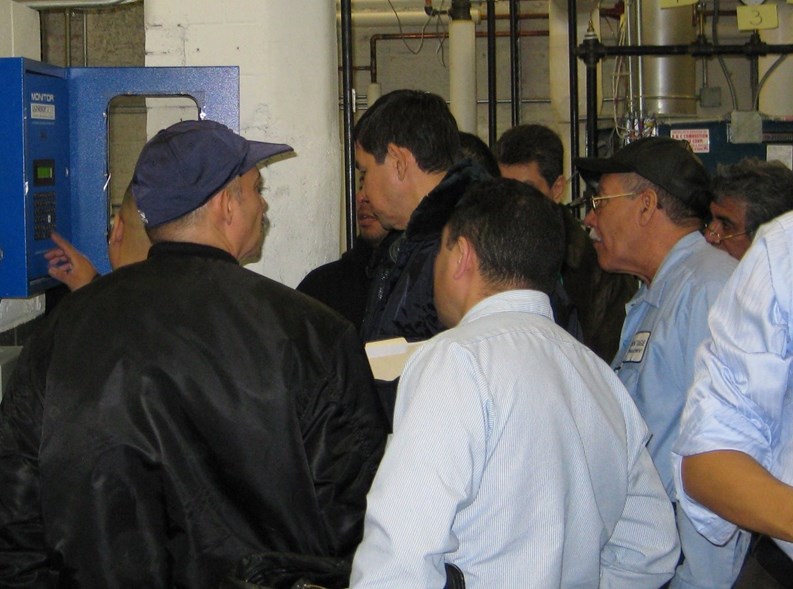When you rank the key players who keep your building functioning from day to day, the superintendent should probably be placed close to the top of the list. A building’s super has a tremendous amount of responsibility, including looking after the safety and security of residents, managing and interacting with other support staff, and maintaining the building’s physical systems and structure. It’s a tall order, to say the least.
“Boards are made up of volunteers who often have their own interests in mind,” says Joe Scholes, vice president of Cooper Square Management & Realty Services in Rockville Center. “The managing agent has a portfolio of buildings that he takes care of. In a typical co-op or condo, there’s only one person there on-site every day—and that’s the super. He or she is the only one doing this as a full-time occupation. He is the key guy, and boards are recognizing the value of these employees.”
Solid teamwork between the managing agent, the superintendent and the board is vital to any building of course, but a building’s day-to-day functioning—both mechanically and as a workplace for other staff members—is really only as smooth and professional as its superintendent. Hiring the right person for the job is therefore critical for a building’s success.
Finding the Right Fit
Because no two buildings are alike, there is no single model of what a “perfect” super should be or what characteristics they should have. He doesn’t need to just be someone who cleans the lobby and changes light bulbs—unless that’s all the building is looking for. Some building communities want a super who can hold down significant administrative duties, while others will search for someone who is a fix-it maven and is constantly hands-on with problems—and some want both.
“A super needs to match the building that he’s going for,” says David Khazzam, vice president of PRC Management Corporation in Manhattan. “There are luxury, high-end Park Avenue condos that require more of a suit-and-tie type who is in charge of the maintenance staff and caters to the owners of the building. Or it could be a co-op in Queens where they need a working super. It’s a mix-and-match situation.”
Scholes concurs. “There’s a wide variation between buildings therefore the same applies in the qualifications you look for in supers,” he says. “Generally, there are two categories: a hands-on, working super, usually in a building with a small staff and 100 units or less, where [he] does a lot of what handymen may do, like maintenance on boilers and minor repairs. On the other hand,” Scholes continues, “you have a resident manager in larger buildings with a larger staff and who puts more emphasis on the more managerial aspect of the job. They can also be called on to do some repair work, but generally speaking what they do is more managerial in nature.”
Beyond differing job descriptions however, and “skills in plumbing, electrical and heating,” “There are certain traits that every super should possess,” says Peter Grech, director of education for the New York City Superintendents Technical Association (NYCSTA). “Patience is a very good trait. Compassion is important. Communication is also key, because you need to know how to talk to people at their levels. I would also throw in psychology because you need to know how to defuse situations with residents.”
Grech advises boards and managing agents to know exactly what they are looking for before starting an interview process for a new super. “Frankly, I don’t think most boards know what they are looking for,” he says. “I think they need to sit down before the interview process and think about their needs. If you get a super who knows his stuff and then start to micromanage him because there was no discussion about your expectations for him beforehand, there’s going to be divorce down the line. He could be a great super, but might just be the wrong guy for your building.”
One point that many sources for this article stressed was the need for supers to have better written communication skills than perhaps might have been necessary in decades past. This is due to several factors, but foremost among those is the necessity of responding to e-mails. Electronic communication has become such an important component of the job description as supers deal with residents, managers and board members via computer that no super can afford to neglect that particular skill.
The Education Question
The education of a super is a tricky subject. Some buildings want a super who has gone to school and formally developed the skills required, while others are more interested in someone who has had a great deal of on-the-job training.
“I try to look for supers who have a joint skill set that will supplement the biggest inherent issues of the building,” says Khazzam. “The best experiences I have had are handymen who are promoted and become supers. Or supers who I know in buildings who have grown in the situation, and maybe become overqualified, and now want to be in charge of a larger building.”
For his part, Grech believes that the best type of education comes from learning on the job. “You can learn out of a book, but when you get to the real thing, the book can only teach so much,” he says. “As time goes on, the super becomes better at being a super because he develops better skills. We do go to school to keep up with technology, but that’s secondary to what we learn in actual situations.”
Opportunities to Learn
A well-qualified super isn’t born that way—and the more qualifications and certifications a super has, the higher the pay he or she can command, (and the more salary the building will have to pay), but supplementing a super’s experience and education can have mutual benefits. The super gets to enhance his or her skillset and become more competent and capable, and the building gets an eminently-qualified super with both real-world skills and technical knowledge that can aid him or her in troubleshooting, maintaining, and overseeing the building’s operations.
Educational opportunities for both veteran and journeyman supers are offered throughout the area. For example, Cooper Square runs a learning center for both its property managers and supers to train in to get qualified on a number of systems.
“It’s fairly extensive, with mock-ups of various systems that exist in typical building—elevators, pumps, motors, etc,” says Scholes. “A lot of our supers will train in there. We may bring them in for supplemental training for those who may have five or 10 years of experience and need some training on a piece of mechanical equipment or device where things have changed,” such as new-generation HVAC systems the super might not be familiar with yet.
Other avenues for advancement exist for those supers who want to continue with their education. Unionized workers can take part in various Service International Employees Union (SEIU) 32BJ-sponsored programs that are paid for from their dues. There are also some superintendent-related training programs available through organizations such as the New York Association of Realty Managers (NYARM), and the programs offered by the New York City College of Technology that allow members to gain higher-level technical skills.
Also last fall, U.S. Energy Group provided supers with a free training session to familiarize them with the intricacies of boiler and HVAC operations, especially related to the company’s computerized energy management systems. U.S. Energy Group is a metro-New York based firm, which develops and integrates energy control, monitoring and analysis systems for large residential properties.
Money, Space, and Dealing with Boards
Khazzam believes that a super should report regularly to their building’s managing agent so no unexpected issues arise out of left field.
“There are some very sensitive, involved shareholders and a lot of politics involved,” he says. “The position of a super is not like any other position. I always insist that the board or ownership have knowledge of a situation, but that they maintain a chain of command through the managing agent.”
That doesn’t mean that a super should stay away from the board. In fact, Grech thinks it’s important that a super attend some portion of all board meetings. “He needs to be there and report on the building and answer questions,” Grech says. “A lot of buildings don’t do this, but I think it’s important.”
According to Grech, the law requires a super to live either on-site or within 200 feet for buildings of eight apartments or larger. Certain other buildings are required to have an on-site super if certain pieces of equipment (such as a No. 6 boiler, for example) are in use on the property.
There is no set pay scale for supers—even if they are in a union—and historically, supers have negotiated their own deals as far as money and accommodations within the building are concerned.
“The larger the building or the greater the responsibilities, combined with his own experience and professional well-roundedness all contribute to what kind of salary a super can ask for,” Grech says. “The low end of the pay scale will be around $40,000, mid-range is $60,000 to $70,000, and at the upper end there are supers who make over $100,000 per year.” Accommodations for a super generally include a rent-free apartment with all utility expenses paid for. In situations where the super has a family with children, adequate space for the family must be negotiated with the building.
Since most supers live where they work, and the best develop relationships with building residents that can last for decades, they become neighbors and friends to many of the residents. When a super is hired for a building, they need the full support and backing from the board and manager, with clear expectations and mutual professional respect.
“It’s a learning curve and there are going to be mistakes as he settles in,” says Grech, “But once he does, it will be very rewarding.”
Keith Loria is a freelance writer and a frequent contributor to The Cooperator.







Comments
Leave a Comment